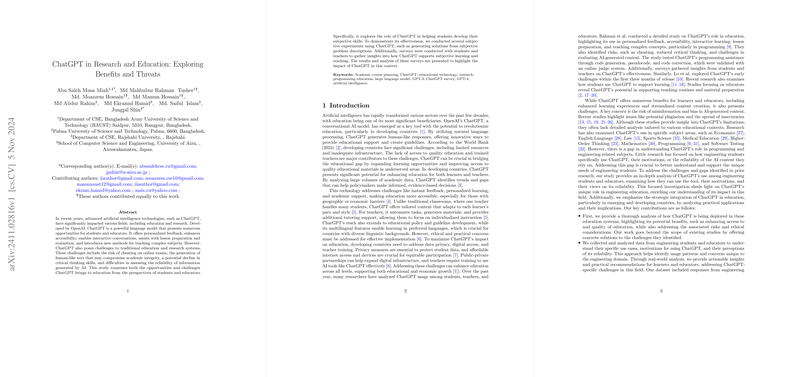Overview of "ChatGPT in Research and Education: Exploring Benefits and Threats"
The paper "ChatGPT in Research and Education: Exploring Benefits and Threats" investigates the dual nature of OpenAI's ChatGPT as an influential AI tool in educational contexts. Authored by Abu Saleh Musa Miah et al., this paper delves deeply into how ChatGPT, a conversational AI model, profoundly affects educational processes and research methodologies. The impact is notably pronounced in developing countries where ChatGPT serves as an accessible tool to enhance educational equity by providing instant feedback, customized learning paths, and academic support, addressing resources and infrastructure disparity highlighted by World Bank in developing nations.
Key Findings
The paper is methodical in assessing ChatGPT’s educational impact by presenting empirical data collected through surveys and subjective experiments. These surveys and subjective experiments primarily examine ChatGPT's ability to facilitate problem-solving from subjective descriptions in educational scenarios. Approximately 91.4% of students surveyed acknowledged utilizing ChatGPT for swift academic inquiry response, signifying a high usage rate among students. Moreover, the tool's proficiency in assisting with research material sourcing is evidenced by 79% of participants finding it beneficial.
For programming tasks specifically, ChatGPT exhibits robust functionality: 85.2% of students have employed it for debugging, while 87.7% sought its aid in programming problem resolution. These findings indicate that ChatGPT’s underlying architecture, based on LLMs, significantly enhances the learning experience, particularly in technical domains where timely insights are crucial.
Challenges and Ethical Considerations
Notwithstanding its advantages, ChatGPT presents several educational challenges. The risk of students over-relying on AI for assignments and complex tasks could potentially degrade critical thinking and problem-solving skills. A major worry about AI's application in assessments is academic misconduct, accentuating the necessity for examinations that prioritize analytical reasoning over rote memorization.
Plagiarism detection is another concern raised in the paper. AI-generated content can often evade traditional plagiarism detection tools due to the nuanced nature of its language generation, making intellectual property protection challenging. Additionally, inaccuracies and fabricated information in AI responses necessitate cautious use and verification of AI-generated references.
Implications for Future Research and Educational Integration
The authors advocate for strategic initiatives integrating ChatGPT within academic frameworks. Educational policymakers must consider ChatGPT’s integration thoughtfully, ensuring its benefits in materials development, feedback provision, and personalized education outweigh potential drawbacks such as promoting academic integrity and addressing AI biases.
Future Directions
The paper suggests a trajectory for enhancing AI's role in education, emphasizing ethical implementation and rigorous validation methods to improve AI's reliability for academic support. Future research should consider developing AI-detection mechanisms for content verification and exploring innovative pedagogical strategies that leverage AI tools without compromising the innate analytical skillsets vital for academic progression.
Overall, "ChatGPT in Research and Education: Exploring Benefits and Threats" is a reflective paper on the prevailing educational dynamics influenced by AI, offering a balanced view on harnessing AI’s potential while acknowledging the inherent risks, setting a platform for ongoing discourse and development in AI-driven education.
